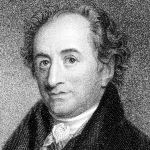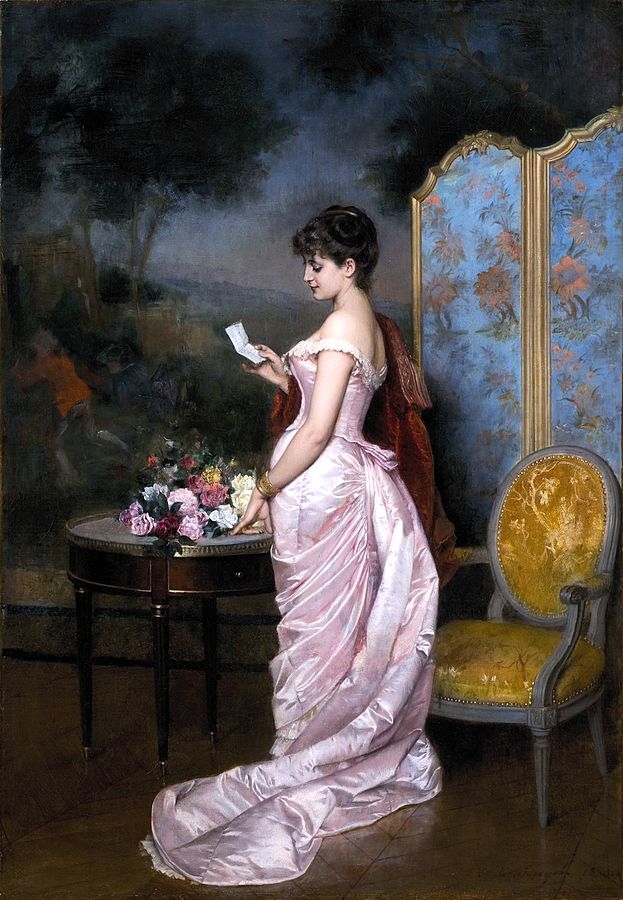 Johann Wolfgang von Goethe (1749-1832) was a German writer and, according to George Eliot, “Germany’s greatest man of letters . . . and the last true polymath to walk the earth.” Goethe’s works span the fields of poetry, drama, literature, theology, philosophy, humanism, and science. His finest and most personal poem, Marienbad Elegy, reflects the devastating sadness he felt when eighteen-year-old Ulrike von Levetzow declined his proposal of marriage in 1823. His magnum opus, lauded as one of the peaks of world literature, is the two-part drama, Faust (1830).
Johann Wolfgang von Goethe (1749-1832) was a German writer and, according to George Eliot, “Germany’s greatest man of letters . . . and the last true polymath to walk the earth.” Goethe’s works span the fields of poetry, drama, literature, theology, philosophy, humanism, and science. His finest and most personal poem, Marienbad Elegy, reflects the devastating sadness he felt when eighteen-year-old Ulrike von Levetzow declined his proposal of marriage in 1823. His magnum opus, lauded as one of the peaks of world literature, is the two-part drama, Faust (1830).
New Love, New Life
Heart, my heart, what can it mean?
What could trouble you so?
What a strange new life, it seems!
You, I no longer know.
Everything you loved is done,
Everything that grieved you,
All your work and peace is gone—
How could this overtake you!
Are you caught by lovely youth
By that beloved form,
By those eyes so good and true,
By that all-powerful force?
When I try to run away,
Collect myself and flee,
In a moment my path strays
Back to her you see.
By that magic thread, so
That cannot be untied,
The dear wanton girl, oh
She holds me fast: and I
Must lie within her magic spell
And live where she may go.
How great the change, I tell!
Love! Love! Let me go!
The Nearness of the Beloved
I think of you, when I watch the sunlight glimmer
Over the sea;
I think of you, when the moonbeams shimmer
Over the stream.
I see you there, when the dust swirls high
On the far road,
When the traveller shivers, in deepest night,
As it narrows.
I hear you, when with a dull roaring
The waters rise.
Often in silent groves I go walking
When all is quiet.
I stay with you, however far you are,
To me you’re near!
The sun sets; soon above me are the stars.
Would you were here!
Marienbad Elegy (an excerpt)
. . . How she waited at the gate to welcome me,
And delighted me, from then on, step by step,
And still after the last kiss ran after me,
To press the last kiss of all to my lips:
This image of the Beloved, so quick and clear,
Is written on my heart, in fiery letters there . . .
. . . Before her gaze, as before the sun’s force,
Before her breath, as before the spring breeze,
Self-regard, for so long frozen, thaws
And melts away within its wintry deeps:
No self-interest, no self-will remains,
At her coming they dissolve again . . .
. . . Flow on then, tears, and flow unquenchably:
Though you could never quench the inner fire!
Already my heart is torn by violent frenzy,
By life and death struggles, hideous desire.
There may be herbs to heal the body’s pain,
But the spirit fails to will or act again,
Fails to grasp: how can I live without her?
Imagining her shape a thousand ways.
Now indistinct now radiantly clear,
Now slow to form, now swiftly snatched away.
What slightest comfort could this ever bring,
This ebb and flow, this coming and this going? . . .
. . . All’s lost to me, myself as well I’ve lost,
I who was once the darling of the gods:
They tested me: they gave me Pandora’s box,
Full of blessings, fuller of danger’s cost:
To their bountiful lips, then they pressed me,
They part me from them, now, and destroy me.
